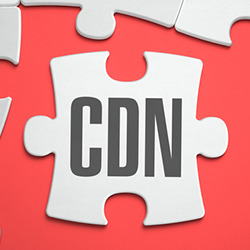How CDN Works?

In 2017, tech maven, Dom Robinson wrote an incredible book called, Content Delivery Networks: Fundamentals, Design, and Evolution. In this book, he details how CDNs are the future of digital and web excellence.
“This book examines the real-world engineering challenges of developing robust content delivery networks (CDNs) and provides the tools required to overcome those challenges and to ensure high-quality content delivery that fully satisfies operators’ and consumers' commercial objectives. It is informed by the author’s two decades of experience building and delivering large, mission-critical live video, webcasts, and radio streaming, online and over private IP networks,” writes the description. After two years since the book’s release, Robinson’s words ring truer than ever.
What is Content Delivery Networks?
For those who are unaware, a CDN is a group of servers that are placed in multiple areas around the globe to better transmit media and content to global users. That established, websites backed-up by CDNs can better ensure their users a smooth digital experience.
To better illustrate the depth of what it does, let’s say you run a website hosted by a web server that’s based in Australia, your home country. After months of putting out great content, you’re starting to realize more and more visitors from overseas.
When this happens, your site faces three initial hurdles: one, the more people access your website, the higher the load your web server has to handle. This creates a problem because web servers can only manage a certain extent of traffic. Once your site goes through a traffic spike, your users either experience a lagging on the webpages or an incomplete loading of your site’s media and content.
Two, your users outside Australia will find accessing your website to be a little tedious because of latency. That means your site’s visitors that are a lot closer to your web host may have better chances of consuming your content efficiently.
Lastly, you're also going to encounter bandwidth problems as your site will have to respond to a larger number of visitors. Web servers usually have very limited bandwidth packages depending on what you get.
A CDN improves all three problems as it improves not just speed, but also quality.
CDN: what do I get?
Robinson eloquently explains in the book the many advantages site owners get. To simplify there are about three solid perks site owners get. Apart from speed, CDNs also cache the updated version of your site’s updates. say, you upload two new articles with 5 videos in each post. Servers all around the globe or at least those your site is connected to, automatically saves and stores these updates, so when a user accesses your site wherever in the world they may be, their request to consume your content no longer travels to your web host origin, but to their edge server—the server closest to them.
Additionally, some CDN providers, depending on the package you get, also have the option to re-size your images should there be a need. That means those opening your site get to appreciate your content in full regardless of what device they're using. The truth is, many site owners disregard how their content looks on mobile phones, but given today’s settings, a site owner should put an equal premium on how their website looks like through a handheld device.
What’s more, CDNs also provide an added layer of security; making it harder for hackers to compromise your website. Should your site’s main server be down, users will still be able to visit your site normally as these servers (also called Points Of Presence) store your updates in advance.
CDN: Should I get one?
The answer is mostly yes. CDNs are perfect for providing your users with a great online experience. Know that the better their digital encounter with you is, the more they frequent their site visits, potentially turning into sales. However, CDNs aren’t for everyone. If you run a site that serves a local community near you, then you getting one could only be an added expense. Generally, government agencies, financial institutions, e-commerce businesses, media and publishing websites, and travel blogs find CDN to be useful, simply because they serve a variety of people located everywhere in the world.
Interested in seeing what BelugaCDN can do for your company? Get a free trial and find out for yourself!
Introduction to Content Delivery Networks
How To Implement CDN In Wordpress
Power-up your Content Delivery
30 Day Free Trial Cancel Anytime
Related Resource